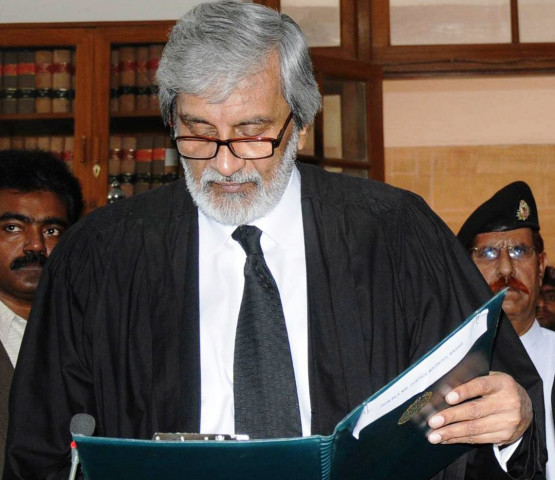Don’t risk damage to priceless assets: Justice Baqar
Judge says there is no doubt OLMT project offers fast mobility to the people of Lahore

PHOTO: RASHID AJMERI/FILE
“Why should we allow irreversible damage to our priceless assets that we have in the shape of centuries-old heritage, like the elegant and splendid masterpiece from the times of brilliant Mughal civilisation, the Shalimar Gardens, which has been recognised as an ‘asset of outstanding universal value’, having ‘significance’, which ‘is so exceptional as to transcend national boundaries and to be of common importance for present and future generations of all humanity’, deserving permanent protection as a ‘heritage of highest importance to the international community as a whole’, and has thus been inscribed on the world heritage list, or the monumental gateway known as Chauburji… which is a beloved urban landmark, and a highly visible icon of Lahore,” says Justice Baqar in his 50-page dissenting note.
He also noted that Pakistan was under international obligations to preserve the heritage sites. He said that scrapping the OLMT project was in nobody’s interest. “All that is required is to ensure that no harm to the monuments is caused by the impact of the project,” he wrote.
Justice Baqar also noted, “Beyond their visual appeal, the monuments are reflective of our glorious past and carrying immense cultural, social, and historical significance. The monuments… admittedly bears signs of abuse and neglect and suffers from vagaries of weather. Some of these have already developed cracks, and unfortunately, neither the endurance of these monuments has been evaluated, nor the susceptibility of their foundations measured. These foundations have also not been taken into account while calculating the distance between the track and the monuments.”
LHC orders Punjab to present inquiry report tomorrow
The judge observed that in terms of Article 4 of The Convention Concerning the Protection of the World Cultural and Natural Heritage adopted by the General Conference of the United Nations Educational, Scientific and Cultural Organisation (UNESCO), to which convention Pakistan was a signatory, “we are obliged to ensure the identification, protection, conservation, presentation and transmission to future generations of the cultural and natural heritage, and to do all that we can towards the said end to the utmost of our own resources and, where appropriate, with any international assistance and cooperation, in particular, financial, artistic, scientific and technical which we may be able to obtain”.
Justice Baqar also emphasised, “The purpose, object, intent, and spirit of the 1975 Act and the 1985 Ordinance are the preservation and protection of movable and immovable antiquities, and special premises.
“Both the laws contain elaborate arrangement and provisions for carrying out the aforesaid intent and purpose, including that of declaration and listing of particular properties as antiquities, for enforcing their protection, and of making arrangements for custody, preservation and protection of the antiquities.”
The judge noted that the country had also benefited from the technical assistance and financial help provided by UNESCO, in respect of Shalimar Garden and the Lahore Fort, which had been on the world heritage list since 1981 and, as per a UNESCO report, received financial assistance totalling $121,000, for maintenance and uplift.
Confessing Crime: Billah admits of attack on Justice Baqar
“No doubt OLMT project, being a mass transit project, offers fast mobility to the people of Lahore and is planned to cater to about 245,000 passengers every day. The facility shall be an efficient, affordable and environment-friendly transport service, and shall help in reducing traffic congestion and the travelling time between places… but if we recall, heritage also has immense significance, and offers a lot of public good and public benefits and also helps in poverty alleviation. Its positive influence on livability, economic growth, and human development is now well recognised. Heritage holds some of the finer graces of civilisation. It anchors people to their roots, builds self-esteem and restores dignity and provides an impetus for local economic development and prosperity.”
In the circumstances, he disposed of the present appeals by directing the Punjab archaeology director general to ensure that the heritage impact assessment in the matter was carried out afresh, keeping in view his observations, and preferably with the assistance of UNESCO, who seemed ready and willing to provide such assistance. “If need be, an organisation with [relevant] expertise like [Britain NGO] English Heritage may also be associated with the exercise,” he suggested, before calling for the speedy initiation of the work.



















COMMENTS
Comments are moderated and generally will be posted if they are on-topic and not abusive.
For more information, please see our Comments FAQ